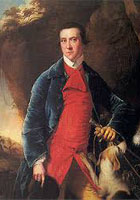Francis Noel Clarke Mundy Biography
Quoted from Needwood Forest and the Fall of Needwood, With Other Poems, 1830, the Preface says, His kindness of heart was shown in his intercourse, not only with the rich and the noble, but with the patient poor and the secret sufferer. It was his delight to relieve the afflictions of those who lived in the neighbourhood, and the story of misfortune found a listener in his ready sympathy. As a magistrate, in which capacity he for many years presided as chairman at the Quarter Sessions, his impartiality was universally respected, and his interpretation of the laws held in reverence. The firmness with which he enforced their sanctions, was tempered by a lenient consideratio
"The Volume now presented to the Public, consists of two principal descriptive Poems, and several smaller effusions in verse, chiefly exhibiting the playful spirit of their Author. The late F. N. C. Mundy, Esq. still lives in the remembrance of many of those friends, who were cheered and instructed by his early familiarity, and his extensive acquaintance with men and manners. ... ... But it is in the amiable character of one whose taste was highly cultivated, and over whose social relaxation it threw a constant charm, that Mr. Mundy appears in the volume now published.
"Needwood Forest" was first presented to his friends in the year 1776, and was read with great interest by all who were familiar with its verdant lawns, its shelving banks, its far-stretching vistas, and its variegated bowers. The "Fall of Needwood" was published when the decree had gone forth for its enclosure. Still there are portions of that once-delightful scene preserved, as if to show how magnificent and how beautiful it must have been in its prime, and these are described with much tenderness of feeling, awakened by the force of contrast. These Poems have long been out of print, but as they are often inquired for, it was considered by the Editor, that he could not do a kinder service to the neighbourhood, than by presenting a complete collection of the poems of their gifted Author. This he has been enabled to accomplish by the courtesy of F. Mundy, Esq. the worthy representative of his native county, and of his father's honours."
Concerning his home of Wheathills: Francis Noel Clark Mundy, Lord of Markeaton Manor, and Sacheverell Pole, both of whom were original petitioners for the Act of Enclosure in 1763, purchased the land jointly, and paid £110 duty on the purchase, to the auctioneer, a Mr Shaw. It is believed that Sacheverell Pole purchased only a portion of the land, whilst Mundy secured both land and buildings. The land sale realized about £2,960 whilst the 'neat convenient dwelling house and suitable out-offices and extensive farm buildings' fetched £750. It has been suggested that Mundy bought Wheathills with a view to using it as a 'retirement or dowager home' and would pass the running of his Estate to his son, Francis who would take up residence at Markeaton Hall, then located in the present Markeaton Park. However before Mundy moved into the house he decided to extend and probably update the house to a better class of residence in all probability to make it worthy of a person of his standing. He employed a Derby Architect, Samuel Brown, to draw up plans for the alterations and the original account book records show that Mundy spent over £4,900 on this project. The alterations and extensions appeared to take some four years to complete for it was not until August 15th 1809 that the final account was settled. During the ongoing works at the house, substantial sums of money were spent on local artisans, including masons, blacksmiths, carpenters and painters.
Mundy allegedly lived at Wheat Hills until his death in 1815, but records are vague on this point.
To the Honourable Elizabeth Sedley, Learning to Spin, She and the Author equally having an aversion to a Spider.
Wou'd you, though true what Sterne enforces,
That we must have our hobby horses,
...
I call'd my Muse, the rustic came
With Seward's garland on her brows;
Loose was her hair, her robe the same;
You never saw so wild a blowze.
...
Through half her teens, e'en from her birth,
All humour, comedy and mirth,
Of fun and whim the very soul,
While true good-nature marks the whole,
...
Ah, Needwood! I, whose early voice
Taught thy shrill echoes to rejoice;
I, who first pour'd the sylvan song
Thy glades, thy banks, thy lawns along;
...
As one, who journeys over unknown lands,
Ere yet the sun withdraws his western ray,
Stops on some mountain's brow, whose site commands
The shifting scenes and labyrinths of the way;
...
